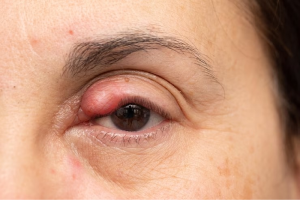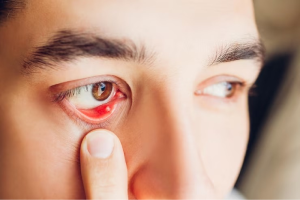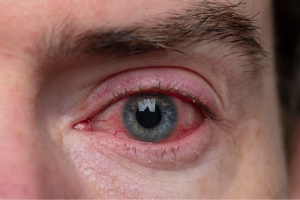Blepharitis is a persistent and frequently occurring inflammation of the eyelids, primarily concentrated at the base of the eyelashes. This condition can cause discomfort, irritation, redness, and other uncomfortable symptoms. It is often a chronic issue that necessitates continuous management and care.
There are various types of blepharitis, each with its unique characteristics. Anterior blepharitis affects the outside front edge of the eyelids, where the eyelashes are anchored. This form of blepharitis is commonly associated with bacterial infections or a surplus growth of normal skin bacteria, leading to conditions such as Staphylococcus aureus or seborrheic dermatitis.
Posterior blepharitis, on the other hand, involves inflammation of the inner eyelid, particularly in relation to the meibomian glands. These glands are responsible for producing an oily substance that forms a crucial component of the tear film, helping to prevent the rapid evaporation of tears. Posterior blepharitis is frequently linked with dysfunction of these meibomian glands, resulting in poor-quality meibum (the oily substance) and subsequent issues with tear film stability.



Anterior Blepharitis: This type affects the outside front of the eyelid where the eyelashes are attached. It is often associated with bacterial infections (commonly Staphylococcus bacteria) and scalp dandruff.
Posterior Blepharitis: This type involves dysfunction of the meibomian glands, which are located within the eyelids and produce the oily component of tears. Posterior blepharitis is often associated with conditions like rosacea and meibomian gland dysfunction (MGD).
Redness:
The eyelids may exhibit noticeable redness, often accompanied by swelling. This redness is a result of inflammation and increased blood flow to the affected area.
Itching or Burning:
Patients with blepharitis commonly experience itching or a burning sensation on or around the eyelids. This discomfort can be persistent and may vary in intensity.
Tearing:
Excessive tearing, also known as epiphora, is a common symptom of blepharitis. The inflammation of the eyelids and the disruption of the tear film’s normal composition can lead to increased tear production.
Crusting:
The development of crusts on the eyelids is a characteristic symptom, especially noticeable upon waking. These crusts may form due to the accumulation of dried tears, skin cells, and other debris along the eyelid margins.
Sensitivity to Light (Photophobia):
Individuals with blepharitis may experience heightened sensitivity to light, a condition known as photophobia. Exposure to bright light sources, such as sunlight or artificial lighting, can intensify discomfort and cause squinting.
Blurry Vision:
In some cases, patients may temporarily experience blurry vision. This can occur due to the compromised quality of the tear film, which plays a crucial role in maintaining the clarity of the optical surface. Additionally, inflammation and the presence of debris on the eyelids can contribute to visual disturbances.
Grittiness or Foreign Body Sensation:
Many individuals with blepharitis describe a sensation of grittiness or the feeling of having a foreign body in the eye. This can be attributed to the inflammation of the eyelids and the disruption of the normal tear film, leading to an uncomfortable sensation.
Eyelash Issues:
Changes in the appearance and texture of eyelashes are not uncommon. Patients may notice misalignment of eyelashes, loss of eyelashes, or an increased tendency for eyelashes to become entangled due to the inflammatory processes affecting the hair follicles.
blepharitis treatment as highlighted by Mr Deshmukh:
Alleviation of Discomfort and Irritation: Effective treatment for blepharitis can significantly reduce discomfort associated with symptoms such as eye redness, itching, burning sensation, and irritation. This leads to an improved quality of life, allowing individuals to carry out daily activities more comfortably.
Prevention of Complications: Managing blepharitis helps prevent potential complications that may arise from untreated or poorly managed conditions. This includes reducing the risk of developing more severe eye issues such as corneal damage or recurrent eye infections.
Improvement in Eye Health: Treatment aims to restore the health of the eyelids and promote the proper functioning of meibomian glands, which play a crucial role in maintaining a stable tear film. This leads to better overall eye health and a reduced likelihood of experiencing dry eyes or related discomfort.
Enhanced Vision Clarity: Addressing blepharitis can positively impact vision clarity. By managing inflammation, crust formation, and other associated symptoms, individuals may experience improved vision quality and reduced instances of blurred vision or sensitivity to light.
Long-Term Management: Proper treatment protocols and ongoing management of blepharitis ensure a consistent approach to control symptoms and minimize flare-ups. This long-term management approach can help individuals maintain healthier eyelids and reduce the frequency and severity of recurring episodes.
Tailored Care Plans: Consulting with an eye care professional for blepharitis treatment allows for a personalized care plan. This plan can cater to individual needs, considering the specific type and severity of blepharitis symptoms experienced by each person.
Relief from Dry Eye Symptoms: Blepharitis treatment often includes measures to improve tear film quality, leading to relief from dry eye symptoms such as a gritty sensation, excessive tearing, or discomfort associated with insufficient lubrication of the eyes.
1. What are the primary treatment options available for blepharitis?
There are several treatment approaches for blepharitis, including eyelid hygiene practices such as warm compresses and lid scrubs, medications like antibiotic ointments or drops to manage bacterial involvement, and artificial tears to alleviate dry eye symptoms.
2. How long does it take for blepharitis treatment to show noticeable improvements in symptoms?
The timeline for improvement varies from person to person. Generally, with consistent adherence to prescribed treatment, many individuals experience relief from symptoms within a few weeks to a couple of months. Severe cases or those with underlying conditions may take longer to show improvement.
3. Are there lifestyle changes that can complement blepharitis treatment?
Yes, certain lifestyle adjustments can support blepharitis management. These include avoiding eye makeup during active flare-ups, maintaining good facial hygiene, using hypoallergenic eye products, and protecting the eyes from irritants like smoke or dust.
4. Can blepharitis treatment completely cure the condition, or is it a lifelong management process?
Blepharitis is typically a chronic condition that requires ongoing management rather than a one-time cure. Effective treatment aims to control symptoms, minimize flare-ups, and maintain healthy eyelid hygiene for long-term eye health.
5. Are there any specific complications associated with untreated or poorly managed blepharitis?
Yes, untreated or inadequately managed blepharitis can lead to potential complications such as chronic dry eye syndrome, corneal damage, recurrent eye infections, and in severe cases, may affect vision clarity. Seeking timely treatment is essential to prevent these complications.










